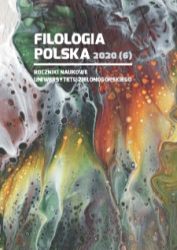Zbigniew Herbert’s attitude towards psychoanalysis
Keywords
Abstract
This article analyses Zbigniew Herbert’s attitude towards psychoanalysis. The legacy of the Polish poet is prevalent among literary scholars. However, until now – as far as I know – no work has been written that would analyse Herbert’s work in the context of psychoanalysis. This sketch attempts to fill this gap, but not in the sense of interpreting individual works. It aims to answer the question: why researchers ignore psychoanalytical threads and do not use psychoanalytical tools. The poet’s attitude towards psychoanalysis was ambivalent. On the one hand, in public statements, Herbert emphasised his reluctance to Freud and psychoanalysis. On the other hand, a lot strongly indicates that he was not indifferent to this intellectual tradition, which, moreover, agrees with the main principle of Herbert’s poetic practice, escribed by the poet in one of the interviews: „The principle of your own opinions questionability. It is the principle of internal dialogue and dialectical tension between preached reason and reason that negates it”.
References
LITERATURA CYTOWANA
Archiwum Zbigniewa Herberta: inwentarz, oprac. H. Citko, Warszawa 2008.
[Google Scholar]
Bielik-Robson A., Na drugim brzegu nihilizmu. Filozofia współczesna w poszukiwaniu nowego podmiotu, Warszawa 1997.
[Google Scholar]
Błoński J., Tradycja, ironia i głębsze znaczenie, [w:] Poznawanie Herberta, wyb. i wstęp A. Franaszek, Kraków 1998.
[Google Scholar]
Bór nici. Wątki klasyczne i romantyczne w twórczości Zbigniewa Herberta, red. M. Mikołajczak, Kraków 2011.
[Google Scholar]
Grabowski A., Herbert – Hermes: konteksty nowoczesności w esejach, dramatach i wierszach Zbigniewa Herberta, Kraków 2013.
[Google Scholar]
Herbert nieznany. Rozmowy, oprac. H. Citko, Warszawa 2008.
[Google Scholar]
Herbert Z., Utwory rozproszone (Rekonesans), oprac. R. Krynicki, Kraków 2010.
[Google Scholar]
Herbert Z., Utwory rozproszone (Rekonesans 2), oprac. R. Krynicki, Kraków 2017.
[Google Scholar]
Herbert Z., Wiersze zebrane, oprac. R. Krynicki, Kraków 2008.
[Google Scholar]
Krynicki R., Od wydawcy, [w:] Z. Herbert, Wiersze zebrane, oprac. R. Krynicki, Kraków 2008.
[Google Scholar]
Kwiatkowski J., Wizja przeciw równaniu. Nowa walka romantyków z klasykami, [w:] A. Stankowska, „Wizja przeciw równaniu”. Wokół popaździernikowego sporu o wyobraźnię twórczą, Poznań 2013.
[Google Scholar]
Mikołajczak M., Światy z marzenia. Echa romantyczne w poezji Zbigniewa Herberta, Kraków 2013.
[Google Scholar]
Potkański J., Sens nowoczesnego wiersza. Wersyfikacja Białoszewskiego, Przybosia, Miłosza i Herberta, Warszawa 2004.
[Google Scholar]
Stankowska A., „Wizja przeciw równaniu”. Wokół popaździernikowego sporu o wyobraźnię twórczą, Poznań 2013.
[Google Scholar]
Wierność. Wspomnienia o Zbigniewie Herbercie, red. A. Romaniuk, Warszawa 2014.
[Google Scholar]
Zbigniew Herbert – David Weinfeld. Listy, oprac. R. Krynicki, Kraków 2009.
[Google Scholar]
Zbigniew Herbert. Listy do Muzy [Haliny Misiołek], Gdynia 2000.
[Google Scholar]
Preview
Downloads
Published
How to Cite
Issue
Section
Categories
Copyright & License

This work is licensed under a Creative Commons Attribution-NonCommercial-NoDerivatives 4.0 International License.
Copyrights (a). In principle, authors who are not employed by the University of Zielona Góra retain the copyright, including publishing rights to the articles, without restrictions.
Copyrights (b). In principle, authors who are employed by the University of Zielona Góra, do not retain the copyright, including publishing rights to the articles. In such cases the copyright holder is the University of Zielona Góra.
Print ISSN
2450-3584-
Abstract231










































